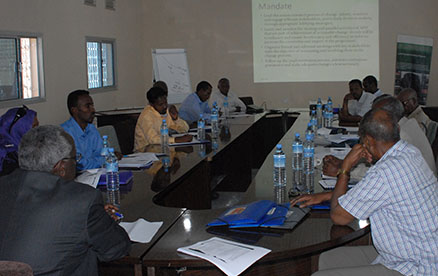Somaliland: A new police law

Somaliland's public institutions have seen considerable growth over the past twenty years. However, law enforcement has continued to be a weak area. In order to address this, Interpeace's local partner, the Academy for Peace and Development (APD), led a consultative process in 2012 to create a draft police law. Such legislation is essential within post conflict societies because it helps to ensure law enforcement agencies are accountable and well-disciplined. Law enforcement agencies that are trusted and reliable are crucial in sustaining peace and addressing societal grievances.
The need for a police law
Interpeace's Pillars of Peace programme, under which APD worked to develop the draft law, encourages the participation of all Somalilanders. This approach ensures that the priorities and perspectives of the people of Somaliland shape solutions for peace, stability and institution-building.
As part of this programme, APD researchers held meetings and forums with members of the public, the government and the private sector. In these meetings APD asked for their perspectives on the underlying factors that contribute to the recurrence of conflict within the region. From these discussions it was concluded that Somaliland's police required a comprehensive legal framework to support and guide their work. A steering committee was established by APD to oversee the development of a draft law and make sure it became a reality.
Development of the draft law
During the development process APD gathered existing police documents and laws from other countries and then presented them for discussion. It held workshops and larger public forums all over Somaliland. These gave public, private, and civil society figures the opportunity to express their opinions on police and security issues. Experts on police matters offered specialized knowledge and a number of female police officers gave input on issues faced by women within the force. APD then supported the Parliamentary committees in developing the draft law by helping to analyze this information and offering additional legal support.
Police law enacted
APD's approach of playing a supportive role to state institutions in the development of this law, while also assisting to build their capacity, proved very successful. Its activities received support from Somaliland's President Silanyo, who provided his personal advisor on security issues to the team. The Minister of the Interior and the Police Commissioners also took part in the process.
The House of Representatives adopted the draft law on 5 October 2013, which resulted in the establishment of the first ever police law of Somaliland. The new police law will help to professionalize the police force, in turn significantly enhancing its legitimacy within society. The law is essential because it defines the authorities and regulates the roles and responsibilities of the police force.
Towards a more conflict-sensitive police force
The need for an unbiased criminal justice system was clearly identified within the planning process for the law. The new police law seeks to ensure that nobody is treated better or worse by law enforcement institutions on the basis of their clan. It contains recommendations that strengthen the police and their ability to become agents of change within Somaliland´s peace- and nation-building process. The law also provides a framework through which the police force can become more conflict-sensitive and better equipped to uphold the rule of law, thereby helping to maintain peace in Somaliland.























